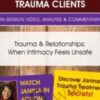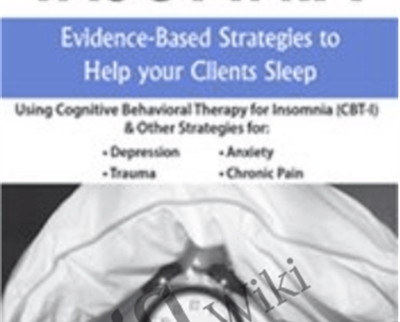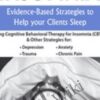$199.99 Original price was: $199.99.$75.00Current price is: $75.00.
6 Hours 18 Minutes
One of the biggest mistakes you as a clinician can make is NOT asking about the client’s sleeping habits. We all know the necessity of sleep – especially for those who are depressed, anxious, obsessively worried, or in chronic pain – yet often we overlook this. And worse, we think there’s nothing we can do to help them.
 Purchase this course you will earn 75 Points worth of $7.50
Purchase this course you will earn 75 Points worth of $7.50Elevate your skills with the Treating Insomnia: Evidence-Based Strategies to Help Your Clients Sleep – Meg Danforth course, available for just $199.99 Original price was: $199.99.$75.00Current price is: $75.00. on Utralist.com! Browse our curated selection of over 60,000 downloadable digital courses across diverse Uncategorized. Benefit from expert-led, self-paced instruction and save over 80%. Start learning smarter today!
One of the biggest mistakes you as a clinician can make is NOT asking about the client’s sleeping habits. We all know the necessity of sleep – especially for those who are depressed, anxious, obsessively worried, or in chronic pain – yet often we overlook this. And worse, we think there’s nothing we can do to help them.
Join me, Meg Danforth, and I’ll show you successful, proven techniques I’ve developed over the last decade on how to optimize your clients sleep – without medication!
Discover evidence-based strategies to help your clients increase energy during the day, sleep more deeply, and re-initiate sleep after hot flashes, panic attacks or nightmares. The strategies I will show you can be easily integrated into existing treatment for depression, chronic pain, trauma and anxiety.
Take the next step and join me today, I will help you learn new assessment tools, step-by-step CBT, and counter-arousal strategies that your client can immediately use. My engaging workshop will include discussion of case vignettes, experiential exercises, examples of sleep logs and other tools to use in your clinical practice.
- Select assessment tools that screen for other sleep disorders and identify insomnia treatment targets as it relates to case conceptualization.
- Teach clients about the science of sleep, causes of chronic insomnia and the impact on overall mental health.
- Explore three models of CBT-I delivery and implementation issues for different practice settings.
- Specify why CBT-I is effective for clients with co-occurring issues such as pain, depression, anxiety or trauma.
- Set-up treatment strategies that clients can easily implement to manage fatigue.
- Collaboratively design a sleep schedule with clients using a sleep diary to improve client's sleep efficiency and daytime functioning.
Sleep Regulation
- Sleep homeostasis
- Behaviors that interfere with the build-up of sleep-drive
- The circadian system
- Behaviors that interfere with optimal timing of sleep
- Arousal system: behaviors that cause conditioned arousal and cognitive emotional hyperarousal
Assessment
- How to get useful information from sleep diaries
- The difference between sleepiness and fatigue
- When to make a referral to a sleep clinic
- Other assessment issues
Sleep Medications
- Why some medications do not work
- CBT-I as the most effective and longer lasting treatment
Cognitive Behavior Therapy for Insomnia (CBT-I)
- Sleep Restriction Therapy (SRT): Restore the Sleep Drive
- Calculate optimal time-in-bed prescription
- Collaborate on the best “sleep window”
- Special cases: when to use sleep compression instead
- Stimulus Control (SC): Addressing Conditioned Arousal
- Select an optimal standard rise time
- Fatigue management strategies to eliminate napping
- Special cases: when to use counter control instead
- Combining SC and SRT in one-session CBT-I
Counter-Arousal Strategies
- Identify and change negative thoughts that keep people awake
- Behavioral experiments
- Thought records
- The buffer zone
- Socratic questioning
- Structured, scheduled problem-solving
- Mindfulness
- Troubleshooting difficulties with adherence
- High sleep anxiety vs. high arousal
- Awakenings from pain, hot flashes, panic or nightmares
- Using light and activation in those with depression
Modifications to CBT for Insomnia in Complex Cases & Comorbidity
- Major Depressive Disorder
- Chronic pain
- Anxiety disorders
- Post-Traumatic Stress Disorder
Implementation Issues
- Relapse prevention
- Delivery issues
Get Treating Insomnia: Evidence-Based Strategies to Help Your Clients Sleep of author Meg Danforth only price 79$
Tag: Treating Insomnia: Evidence-Based Strategies to Help Your Clients Sleep – Meg Danforth Review. Treating Insomnia: Evidence-Based Strategies to Help Your Clients Sleep – Meg Danforth download. Treating Insomnia: Evidence-Based Strategies to Help Your Clients Sleep – Meg Danforth discount.
Cultivate continuous growth with the Treating Insomnia: Evidence-Based Strategies to Help Your Clients Sleep – Meg Danforth course at Utralist.com! Unlock lifetime access to premium digital content, meticulously designed for both career advancement and personal enrichment.
- Lifetime Access: Enjoy limitless access to your purchased courses.
- Exceptional Value: Benefit from savings up to 80% on high-quality courses.
- Secure Transactions: Your payments are always safe and protected.
- Practical Application: Gain real-world skills applicable to your goals.
- Instant Accessibility: Begin your learning journey immediately after buying.
- Device Compatible: Access your courses seamlessly on any device.
Transform your potential with Utralist.com!
Related products
Uncategorized
Legal Risks in Nursing Documentation – Use Extreme Caution When Skimming the Facts – Rosale Lobo
= 40 Points
Uncategorized
= 35 Points
Uncategorized
= 85 Points
Uncategorized
= 85 Points
= 72 Points
Uncategorized
Optimizing Compliance and Maximizing Revenue for Ophthalmology and Optometry – Jeffrey P. Restuccio
= 85 Points
= 125 Points
Uncategorized
Managing Patient Emergencies: Critical Care Skills Every Nurse Must Know – Dr. Paul Langlois
= 85 Points





